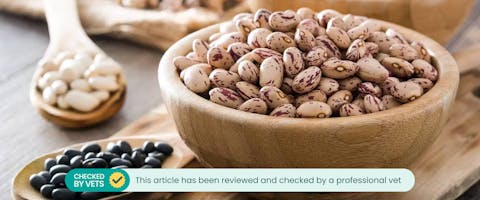Updated 21/09/2023
Beans are a protein powerhouse for us humans - packed with calories and antioxidants that contribute to heart health and might even prevent diabetes, it’s safe to say that beans and legumes are a healthy choice for us humans. But what about our feline friends? Can cats eat beans, and get the same benefits as us? Let’s find out.
Trending posts
Purr-use some of the top blogs our members have been loving this month- Top male dog names for your new furry friendGot a new furry family member in your pack? Check…

- Top female dog names for your new fluffy palWelcoming a new pooch into your family? Explore…

- 250+ gray cat names your silver feline will loveRecently welcomed a fluffy gray bundle of joy into…

- What are normal pet sitting rates?Discover the average pet sitting rates for animals…

- Unique dog names to stand out from the packDare to be different with our list of the best…

Can cats eat beans?
Mainly, yes. Cats can eat beans. But as usual with foods mainly eaten by us humans, there are a fair few caveats to be aware of when it comes to sharing beans with your feline friend. As you’ll know, beans are full of protein, which is great for us humans. When paired with other foods containing amino acids, (human) vegetarians can get all the protein they need by eating beans and legumes. But it’s different in the feline world - cats are obligate carnivores, which means they need to have the protein from other animals specifically to get the nutrients they need, unlike us humans.
Are beans poisonous to cats?
So, are beans safe for cats? If we’re talking legumes, yes, chickpeas, black beans and the like are safe enough for your kitty to try on the rare occasion. But, as cats need a meat-based diet to stay healthy, don’t make a habit of feeding your cat beans. Instead, choose a cat food that’s just right for their age and any health needs they might have.
Are beans good for cats?
In all honesty, beans (as in legumes) are pretty unnecessary for cats - there’s no real reason your kitty should be tucking into them. While they’re full of protein, it’s not as beneficial for cats as animal protein, so that’s what you should be sticking to when topping up your fluffy friend’s dinner bowl.
Beans have lots of fibre which can be hard for our feline friends to digest, and may cause diarrhea and bloating/gas if fed in significant quantities.
Finally, if we’re talking coffee beans or cacao beans, well these are completely off-limits. Both contain caffeine, and cacao beans contain theobromine - both of which cause serious health complications for our pets. Reactions to these compounds include vomiting, diarrhea, increased body temperature, seizures, coma, and even potentially death if enough have been consumed.
Feeding your cat beans
If you’re a pet parent of a fluffy feline, you’ll know that many of the ingredients we humans pepper our food with are either toxic for cats or will upset their stomach. So, if you’re feeding your kitty beans, make sure they’re served completely plain. Opt for plain cooked beans that aren’t covered in any sauces, or so much as sprinkled with salt and pepper. It can be tempting to enhance the food you’re serving up to your precious pet family, but trust us when we say that they (and their stomachs) will thank you for keeping their dinner plain! Lastly, it’s recommended to prepare them to a human-safe standard – i.e. if they are beans that need rinsing and cooking, then do this before feeding them to your cat, just as you would a human.
Meet our veterinary expert, Greg
This article has been checked by veterinarian Dr Greg Steele MA VETMB MRCVS. A mixed vet working in the UK since qualifying from Cambridge University in 2015. Greg enjoys working with all species of animals in all settings, but equally takes pride in communication and education of clients too. He lives with his wife and their cat, and enjoys a variety of sports, gardening, and the great outdoors.
Other foods that are safe for cats
When considering whether to share a morsel of your dinner with your feline friend, be sure to get in the know about what cats can and can’t eat first. And more often than not, lots of the typically ‘human’ foods that are safe for cats are often not recommended in large quantities, so like with anything, knowledge is power! To get you started, here are some foods that are safe for cats…

